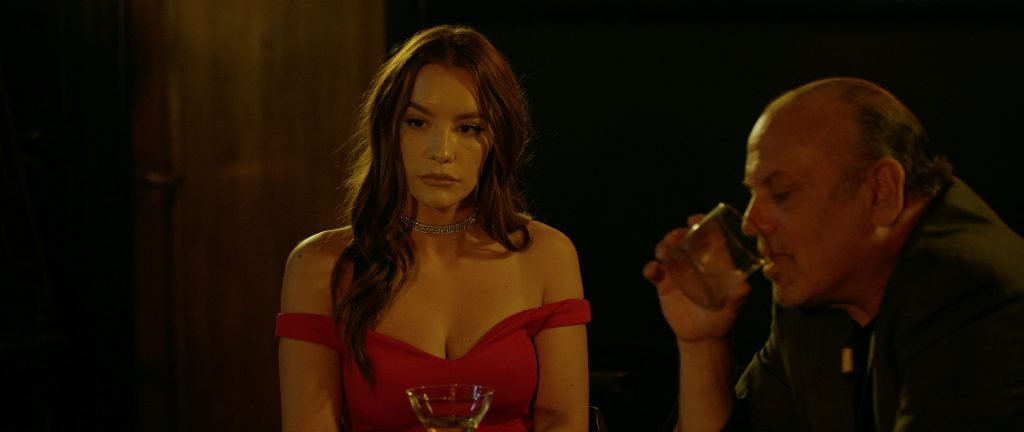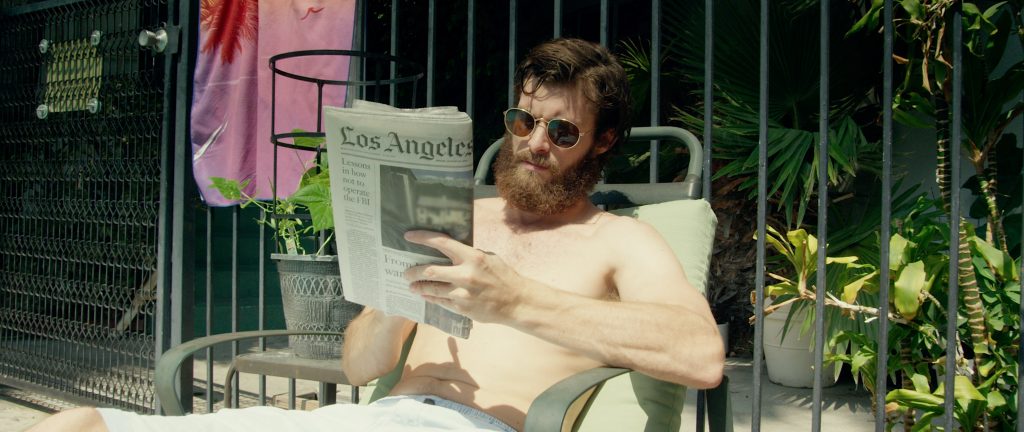“A fool’s paradise is a wise man’s hell.” – Thomas Fuller
A fool’s paradise is an illusory form of pleasure derived from vanity, nonsense, and self-satisfaction. Therefore, any state of happiness will be based on fictitious hopes or expectations. And it’s with that quote that Chameleon (2019) kicks off, in the hopes that we will realize who’s a fool and who’s a wise man.
Set in Los Angeles, ex-convict Patrick (Joel Hogan) is released and, at first, dedicated to becoming a functioning member of society. That all goes down when his old cellmate Dolph (Donald Prabatah) gets out and pressures Patrick into swindling the trophy wives of rich, old men. Whilst the idea of taking it from the snobbishly wealthy is not new, it’s the approach that writer and director Marcus Mizelle took with the film that makes it unique, especially in the indie scene.
Also Read: What Exactly is Under The Silver Lake?
Not hiding its reverence for Jean-Pierre Melville, Chameleon is the crime thriller with noir roots we deserve. Much like the French director, Mizelle also relies on an intense arc of the doomed antihero; Patrick is not that different from Alain Delon’s Jef Costello in Le Samouraï (1967). Both are stoic yet alienated men of purpose who behave according to rigorous professional codes, which builds a dubious philosophical world around the gestures of criminality.
In that sense, our protagonist’s conflict is palpable; Patrick attempts to distance himself from the criminal and uncultured world, however his dilemma arises because of what’s criminally acceptable and what’s just downright morally wrong. The fine line between right and wrong, mixed with his own personal romantic feelings, makes for a curious character study of the ex-convict, elevated by Joel Hogan’s riveting nuanced portrayal of a conflicted soul.
But what makes Patrick such a compelling character is, after all, his moral ambiguity. Because of the unique circumstances surrounding him, we, as an audience, are able to view his actions through the lens of various ethical standpoints. In other words, he is the perfect antihero. Are his criminal actions justified? Is evil defensible if it brings feelings of guilt? And is there any way to know if there is actually guilt? These are the questions we extract from the film. And because these questions can spark debates on ethics that can go on forever, Patrick is a character that can strangely be sympathised with due to how he feels mentally; his criminal background intimidates us, but it’s that constant reminder that all Patrick wants to do is be accepted by others which makes him such an endearing character.

After being pulled back into the criminal underworld of L.A., Patrick is withdrawn and completely unable to communicate in a social setting. In the beginning of the film, we see him establishing a relationship with a woman from the restaurant where he works at as a dishwasher. But after Dolph contacts him and they start to work together, we don’t see Patrick having any social interactions besides the ones he builds with his victims.
Mizelle indicates this isolation through a few shots that portray Patrick as nervous and fearful looking. When his so-called friend forces him into a state of ultimate anguish and despair, there is only one thing that can pull Patrick from the brink and save him from his seemingly inescapable agony: his saviour angel, Rebecca (Alicia Leigh Willis).
Similar to Chameleon (2019): Why Birdman’s Lesley Can be Betty From Mulholland Drive?
While Prabatah’s intimidating Dolph is a concentred version of Patrick’s own frustrations and anxieties, that are eventually doomed to dissolve into a lonely end, Patrick tries to distance himself from the words and actions of his violent prison mate. And their relationship underlines that Patrick is trying to escape the world that he is fundamentally apart of; his body language is reminiscent of his anxieties and frustrations that defines him for most of the film, even if his yearning for stability gives us hope for him as an audience. But unfortunately, Chameleon (2019) is a tragedy, meaning that the purpose he has attained by projecting his frustrations into an ill-fated romance with Rebecca is only temporary, and his greed is enough to push him back down into an emotional pit of loneliness in his struggle to understand his place in an inevitably doomed society.
One can argue that Patrick wants to isolate himself from the crime scene of L.A., however, he finds he cannot fully do this, and that he’s tainted by the futility and superficiality surrounding the town. After all, Los Angeles is the centre of the entertainment industry and thus a hub of staggering wealth, which has given rise to a culture of glamour, exclusivity, and conspicuous consumption. It’s a sprawling city with no culture, built on perception and shallowness; people live off some Hollywood fantasy, with their noses in the air and no inner core.

That’s a perspective that has long been satirised in movies, and Ryan Gosling said it best in La La Land (2016): “That’s L.A. They worship everything and they value nothing”. Chameleon also explores this side of the city. The cinematography by Mizelle and Victoria Stein makes use of picturesque Southern California sites, and the colourful backgrounds contrast with the dark themes the film explores. The bright and cheerful colour palette suggestive of summer, happiness and light fun makes us question wealth and class in quite a layered way; the arid landscape of the city matches the dry solitude of our protagonist in a journey that looks as lonely and depressing as walking through a desert on your own.
Bringing to light a similar L.A. to the one seen in noir classics like Kiss Me Deadly (1955), Chinatown (1974) and The Long Goodbye (1973), as well as most recently in Mulholland Drive (2001), Inherent Vice (2014) and Under the Silver Lake (2018), Chameleon portrays the city as a corrupt utopia in which sex, greed and power are the go-to shortcut to success, that will eventually lead to a path of self-deception, alienation and estrangement.
It takes a short amount of time into the non-linear narrative of Chameleon to realise that it doesn’t matter that the characters will have different fates in an exhilarating cross-cutting twist finale à la The Silence of the Lambs (1991). It doesn’t matter if they’re the fool or the wise man either. For with the characters’ ability to mask their true selves, they will all end like a chameleon: deceitful, camouflaged and alone.
Because, all in all, the story of Patrick is the story of all characters, it’s the story of all of us. We’re all dropped in the chaos of an uncaring World and regardless of our circumstances, we are compelled to do what we think is the right thing for us. Chameleon is an extreme case, but there are extreme chameleons constantly walking among us.
Chameleon (2019) premiered at the Dances With Films Festival, at the TCL Chinese Theatre in Los Angeles. Theatrical release and much more coming soon.


